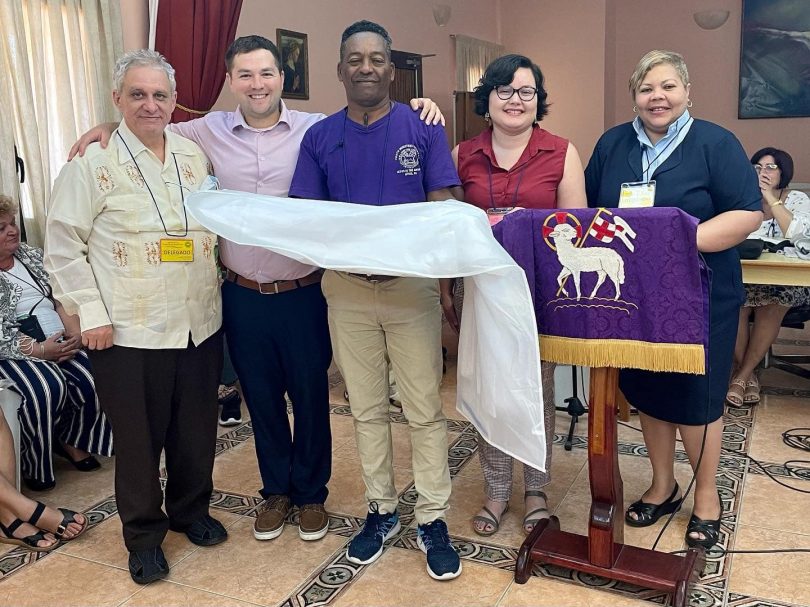God’s Grace is Bigger That We Ever Imagined
by Bishop Chris Giesler
Preaching Text: Matthew 15:21-28
There is just something about human nature that likes the home team…our home team. Even though I’m almost forty-five years removed from high school, I still want to see South Stokes High School winning football games. I have a strong affinity for Duke Basketball because my sister went there, and I had a high school classmate play basketball there. I am a big Green Bay Packers fan because my dad was born and raised in Green Bay, and you have to love the home team. This is common among most folks; it is undoubtedly the case with the Philadelphia Eagles fans living around me in Bethlehem, PA, who now believe that since the Eagles almost won the Super Bowl last year, this will be their year. Hope springs eternal!
The truth is that we feel the same way about the towns that we are from, the ethnic group we are a part of, the language we speak, the way that we worship, and the list will go on. It is just our human nature to affiliate with those who seem to be most like us or have come from the places that we come from.
In the Gospel lesson for us this week, Jesus and his disciples have made their way to the region of Tyre and Sidon. This region is far north of Galilee and is found in present-day Syria. This was called Phoenicia in Jesus’ day.
Jesus has been trying to get away from the crowds for some time now. Just before this, Jesus first tries simply to go to the other side of the lake after John the Baptist’s execution, but 5,000 men plus more women and children show up. He cares for them by feeding them with five loaves and two fish. As chapter 15 opens, Jesus is having a big argument with some of the religious leaders, and after that, he seems to say, “That’s enough. Let’s get out of here.”
So they get way out of town, thinking that it will be quiet there, but here is this woman, shouting at Jesus, “Have mercy on me, Lord, Son of David; my daughter is tormented by a demon.” In Mark’s Gospel, she is called the Syro-Phonecian woman, but Matthew calls her a “Canaanite,” which would have carried a bit more baggage. The book of Joshua contains the story of the Israelites killing all Canaanites: men, women, and children. Even in Jesus’ day, there was great hatred between the Jews and the Canaanites.
Back to our story for today, we don’t know what demon possessed the daughter of this woman who is begging Jesus for healing. Most biblical scholars say that most likely, this was some mental illness, or perhaps epilepsy.
At first, Jesus ignores the woman, but she begs all the louder and more persistently to the disciples. They then beg Jesus to make her stop. But his response is biting, saying that she is not his concern; he has come for the lost sheep of Israel. But rather than leave, she throws herself at Jesus’ feet, begging again, “Lord, help me.”
Jesus then digs in his heels most bizarrely by saying: “It is not fair to take the children’s food and throw it to the dogs.” This was the party line in Israel; the folks at home would have all said, “AMEN, way to go, Jesus!” He would have scored valuable political points for his response here. How could Jesus say this?
But the woman is relentless, saying, “Yes, Lord, yet even the dogs eat the crumbs that fall from their masters’ table.” And with that, Jesus changes his tune and heals the woman’s daughter.
Why is this story here? Let’s place it within the sweep of Matthew’s Gospel because you might say that this lesson has fit Matthew’s agenda all along. From the Magi at the beginning of Matthew’s Gospel to the Great Commission at the end, there is a consistent message that God’s grace is bigger than anyone could have imagined.
Two times in Matthew’s Gospel, Jesus praises a person for their faith, both pleading for someone they care for, and both are foreigners: the Roman Centurion from Capernaum and this Canaanite woman.
At the end of Matthew’s Gospel, Jesus says: “Go into all the world and make disciples of all nations.” This means everyone, not just those who look, speak, or act like you—all people.
The healing is miraculous enough… but the reach across boundaries is even more significant. The story of Moravian missions begins with Zinzendorf meeting an enslaved person named Anthony. Anthony tells Zinzendforf about his family, who are enslaved on the island of St. Thomas. Zinzendorf then invites Anthony to tell his story to the people of Herrnhut, and within a couple of years, missionaries are on their way to bring God’s love to those marginalized people. We must admit that they did not do everything right, and in fact, Moravians ended up enslaving people themselves. But at least the doors were opened, and the bounds of God’s grace were expanded, with much work left to be done.
In our world today of deepening division along racial, ethnic, political, and religious lines, today’s text should cause us to wake up. Jesus’ witness is vital as we seek to unite people of different ethnic groups, persuasions, languages, and worship styles. This is the very foundation of mission.







